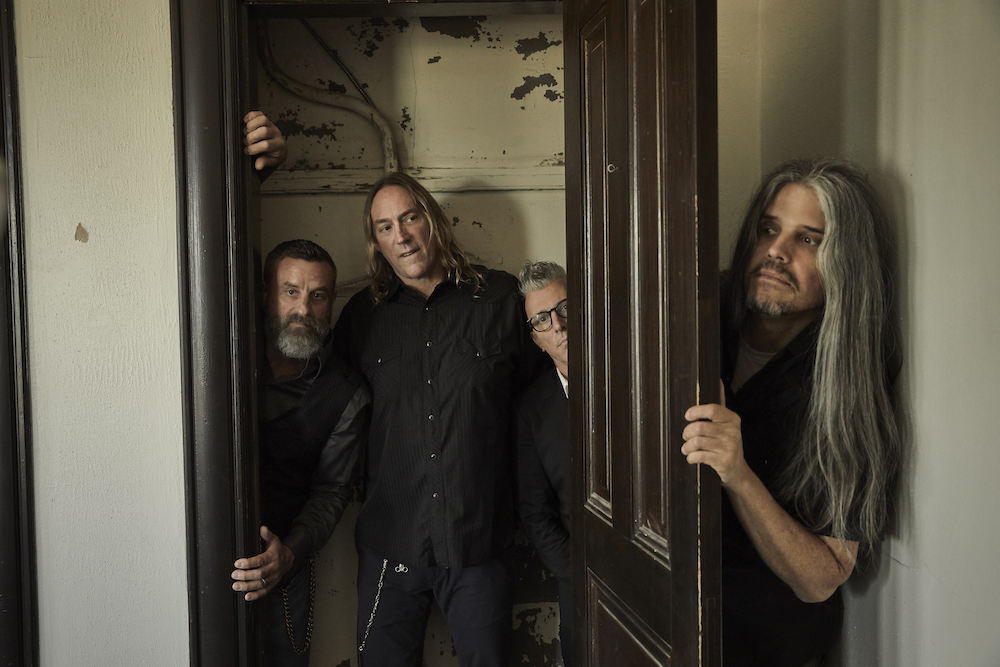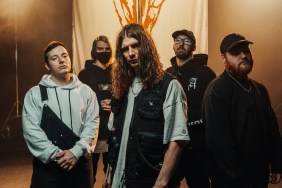The first time Tool bassist Justin Chancellor had an opportunity to really soak up the band’s new album, Fear Inoculum, he was 20,000 feet in the air. The group – minus singer Maynard James Keenan – were returning from Portland, Maine, where they’d spent a day at the studio owned by legendary engineer Bob Ludwig, who was tasked with mastering the album and adding the final sonic flourishes that “make it sound even and nice and good on the radio”.
Although the band were afforded the opportunity to hear the LP on Ludwig’s speakers – which, says Chancellor, “are sitting on concrete pillars that are attached to bedrock; it’s like the ultimate sounding stereo” – it was through more humble means that the bassist finally got some perspective on the record.
“[I was] on a plane flying back to LA listening to it,” he recalls. “I still have a CD Discman, so I was listening to it on my Discman; Bob always gives you a CD. And that’s probably the most satisfying moment when it’s done as it’s going to sound when people buy it.”
It would, however, be some time before Chancellor felt complete relief at having Fear Inoculum finished. That moment came two days before this interview when the album’s title track was released, marking the band’s first new music since 2006’s Grammy-winning 10,000 Days.
“I’m so over the moon, I’m really excited,” he says. “I was a little bit anxious about the single coming out, ‘cos you want it to blow people’s minds, and then it came out and the reaction’s been fantastic. There’s a moment where you get to stop worrying about it, ‘cos it’s out now. So it feels really good.”
The problem with allowing 13 years to elapse between albums, however, is that fans’ expectations intensify with each passing month, making the act of meeting those expectations harder and harder.
“Yeah, especially in the day and age where everyone’s very entitled, and they push a button and Amazon delivers it to their door the day before they actually asked for it,” says Maynard James Keenan from his property in Northern Arizona. “It’s a very strange universe we live in. We are now the older generation going [adopts old, winy voice], ‘Why I oughta! I walked to school in the snow in boots with holes in them and I had to use my finger to turn the dial on the phone to actually make the numbers go…’”
Though Tool may be approaching the 30th year of their career, having formed in Los Angeles in 1990, the fact that they can not only exist in the modern world but thrive by playing a form of progressive heavy music that makes no concessions to popular listening is remarkable. That they can take more than a decade between albums and still maintain their status as festival headliners makes it even more so. Keenan has a typically wry take on the matter. “I think it’s just tenacity and being a slow-moving object that doesn’t really notice that everything else is changing and we’re just going to end up being the last man standing.”
Chancellor, however, has his own theory.
“I think taking your time and doing what you want to do properly is key to that. It’s ironic cos it’s the thing that people talk about: ‘Why did [the album] take so long?’ But the fact that it takes so long is the reason it’s so appreciated too. If we rushed it and didn’t believe in ourselves and we just started to do an impression of ourselves, and just buckled under the pressure and released stuff that we weren’t necessarily happy with, it wouldn’t be respected the way it is respected. To me, it’s art.”
The first hint that Tool were working on a new record came in 2008 when the band’s official newsletter announced that various members were getting together several days a week to work on new ideas. That Fear Inoculum is only surfacing now is, they say, a result of myriad factors, ranging from the fact that touring each year slowed the writing process to legal issues and a bike accident in which drummer Danny Carey broke several ribs.
And then there’s Tool’s songwriting process itself, an act which Keenan finds so tedious that he no longer attends all the writing sessions. Instead, he checks in from time to time and only really starts focusing in earnest on his lyrics and vocal melodies once the music has been completed.
“It’s harder for Maynard, who relies on flashes of inspiration and really trusts his instincts a lot more than we did,” says Carey from Hawaii. “It’s hard for him to be in the room while we’re second-guessing and doing everything with a fine-tooth comb and refining. The tediousness of that really grates on his nerves so he realised he didn’t need to be there for part of it.”
Ask guitarist Adam Jones how the band’s vision for Fear Inoculum changed over the years, and it would appear a vision never really existed in the first place. “Speaking for myself, I just want to do a great job. And it’s just that experimenting and that collaboration and the jamming, you take it down these weird paths and try to do something as best as you can. I don’t know if I really think about where it’s going to end, ‘cos that’s not the process. I have a saying: ‘It’s not good when it’s done, it’s done when it’s good.’ And that has always been the motto.”
Jones points to the song ‘7empest’ (pronounced ‘Tempest’) – which at nearly 16 minutes is the LP’s longest track, complete with a riff in the head-scratching time signature of 21 – as an example of that collaboration and jamming in full effect. “It’s weird and it’s challenging to make something work over a riff in 21, but they’re the kinds of things I get excited about. I can’t explain it. It’s fun, it’s challenging, but it sucks at the same time ‘cos everyone’s going in a different direction with it and you’ve got to figure out what’s best about it and commit and move onto the next thing.”
It’s then Keenan’s job to somehow weave his vocal ideas through these endlessly shifting riffs and non-traditional time signatures.
“I’d like to pretend that it’s super hard and a big challenge and I managed to cure cancer with it, but it’s just not the case,” he quips. “It’s just how I think. It just kind of comes naturally. I love to pretend, ‘Oh my god, you have no idea how difficult that was’, but that would be all bullshit.”
Carey claims to have been shocked when he first realised that 2020 would mark 30 years since Tool played their first show. He still remembers the thrill of the band’s first taste of success with 1992’s Opiate EP and its follow-up, 1993’s debut album Undertow.
“It was a really satisfying feeling. We knew [our music] was good, there’s no question about that. I think back then, and even now, it’s still pretty unique and there’s a high standard of art in what we’re doing. We care a lot about it. We’re really hard on ourselves and we work really hard at what we do.”
–
In a sentence, we are delighted to write, ‘Fear Inoculum’ is out today.












